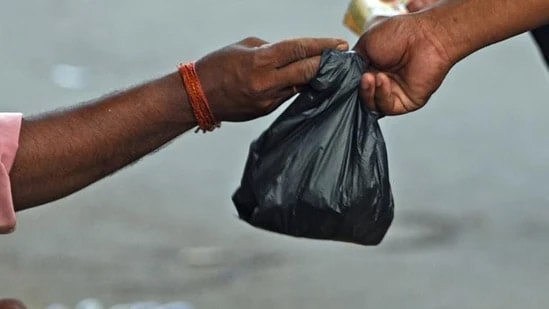According to the notification the permitted thickness of plastic bags, currently 50 microns, will be increased to 75 microns from September 30 this year, and to 120 microns from December 31, 2022.(HT file photo)
The Union environment ministry notified the Plastic Waste Management Amendment Rules (2021) that prohibits the manufacture, import, stocking, distribution, sale and use of identified single-use plastic items.
The latest plastic waste management rules will punish small and medium-scale traders, while the multinationals involved in the business will not feel the heat of new regulations, experts and manufacturers said on Saturday, a day after a notification was issued by the Union government.
The Union environment ministry notified the Plastic Waste Management Amendment Rules (2021) that prohibits the manufacture, import, stocking, distribution, sale and use of identified single-use plastic items.
Atin Biswas, programme director (municipal solid waste), Centre for Science and Environment (CSE), said the list of 19-20 plastic items that will be banned by the government from July 1 next year, is dominated by articles that are manufactured and sold by small or medium-scale manufacturers and traders. The notification will not significantly affect large companies that are responsible for nearly 45-50% of plastic waste generation in the country, he said.
“For instance, if we talk about earbuds that have been listed among the items to be banned by next year, I can only recall one or two big companies that manufacture these. Otherwise, you will see vendors in trains or bus selling earbuds. Through this notification, these are the people—mostly informal sector for whom it is a matter of survival—that will be impacted,” Biswas said.
According to the notification the permitted thickness of plastic bags, currently 50 microns, will be increased to 75 microns from September 30 this year, and to 120 microns from December 31, 2022.
The products that have been banned include earbuds with plastic sticks, plastic sticks for balloons, plastic flags, candy sticks, ice-cream sticks, polystyrene (thermocol) for decoration, plates, cups, glasses, cutlery such as forks, spoons, knives, straw, trays, wrapping or packing films around sweet boxes, invitation cards, and cigarette packets, plastic or PVC banners of less than 100-micron thickness.
HT on Saturday spoke to several small-scale manufacturers, traders of the items that will be phased out by next year. Most of them said that the amendment was “biased” towards the big companies and will lead to the closure of their units.
Rajesh Mittal of the plastic manufacturers and traders association in Delhi said the ministry has defined single-use plastic as “a plastic item intended to be used once for the same purpose before being disposed off or recycled”. He said when the government has clearly defined what comprises single-use plastic, then why items such as milk packets, shampoo sachets, small pet bottles have been exempted from the ban.
“This is a biased law that is meant to benefit the big companies while pushing the small units to closure. The worst impacted would be small industries manufacturing plastic bags, straws and cutlery, which do not have the required technology to abide by the new directions. If you want to impose a ban then do so for all single-use plastic items, but you have not touched the big players,” Mittal said.
Traders in Mayapuri industrial area, which has several small and medium units that manufacture plastic items from plastic cutlery, straws, earbuds, plastic films to covers for invitation cards, cigarette packs, straws etc, said the Covid-19 pandemic has already impacted their business, and this amendment will only push them further into debts and out of business.
“There are some 12-15 units here that manufacture plastic films and wrappers. This is an essential service because this takes care of the hygiene aspect; people prefer not to directly touch things and this film keeps the cutlery safe. By banning this, you are not only ruining our business but you are also impacting the businesses that are dependent on us—restaurants, small scale tiffin services etc,” said Manohar Parihar, who runs Sheetal Packaging Unit in Mayapuri Industrial Area.
Swati Singh Sambyal, an independent waste management expert, said the ban will probably impact big companies as well as small-scale manufacturers, but the smaller ones will be hit harder considering they do not have the economic and technical bandwidth to make the switch.
“If we look at data, as per the India Plastic Recycling Report, 2019 (published by Plast India foundation), there are 1-1.5 million informal workers, directly involved in the recycling business, many of them utilise various recyclable dry waste streams to make lower grade products, many of which are single-use items. Also, there are over 100 organised recycling units (42 in Polyethylene Terephthalate recycling) and over 10,000 unorganised recycling units. So, if we look at numbers, we can imagine the impact,” Sambyal said.
She added, “The notification is a great step but considering the recycling value chain is vast and mostly informal, such unorganised informal units and workers in the recycling business would need support, technical skill-building and even soft loans or subsidies to upgrade to alternative industry.”
Packaging 360 is a comprehensive knowledge sharing ecosystem for the Indian packaging industry. Our services include an online content platform to deliver news, insights and case studies; organising conferences seminars and customised training; Providing Bespoke Project Consulting, Market Research and Intelligence.







